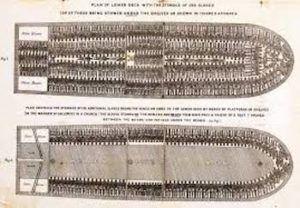
*On this date, 1788, the Slave Trade Act of 1788 was enacted. Also known as Dolben's Act, it was an Act of Parliament that limited the number of people that British slave ships could transport based on tonnage.
It was the first British legislation passed to regulate slave shipping. In the late 18th century, opposition to slavery was increasing. Many abolitionists were aroused by the Zong massacre, whose details became known during litigation in 1783 when the syndicate owning the ship filed for insurance claims to cover 132–142 slaves who had been killed. Quakers had been actively petitioning Parliament to end the trade. To expand their influence, in 1787, they formed a non-denominational group, the Society for the Abolition of the Slave Trade, which included Anglicans of the established church (non-Anglicans were excluded from Parliament).
The act held that ships could transport 1.67 slaves per ton up to a maximum of 207 tons burthen, after which only one slave per ton could be carried. The provisions of the 1788 act expired after one year, meaning that the act had to be renewed annually by parliament. Dolben led the effort to do this in subsequent years, so he regularly spoke against the slave trade in parliament. The act was renewed between 1789 and 1795 and between 1797 and 1798. In 1799, the provisions of the previous acts were made permanent through the Slave Trade Act of 1799.
Some abolitionists, including Olaudah Equiano, a former slave, supported it. However, some, such as William Wilberforce, feared that the act would establish that the slave trade was not fundamentally unjust but merely an activity that needed further regulation.